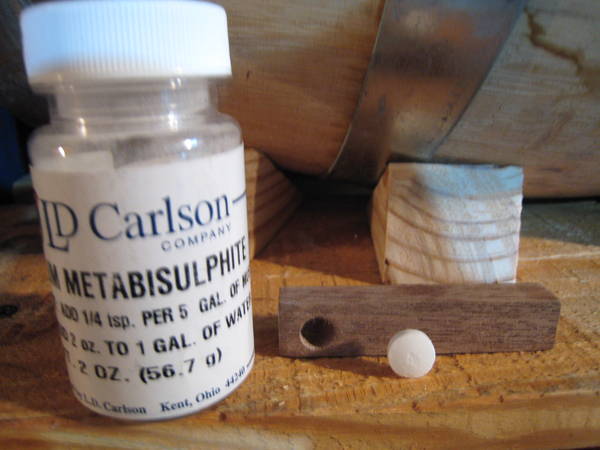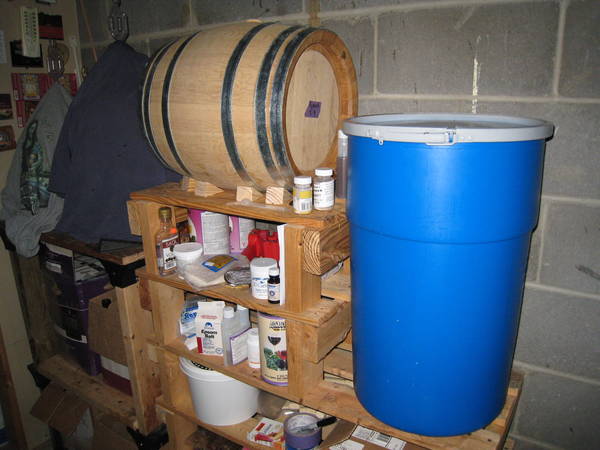summersolstice
Well-Known Member
It seems like every couple of weeks somebody posts questions about preservatives, stabilizers, and sanitizers. Though winemaking and brewing share common procedures, those who brew or make wine exclusively use different methods and ingredients to achieve their results.
For instance, many brewers use Starsan to sanitize but you'll be unlikely to see a wine or mead maker using it. I didn't until I began brewing and now I'm as likely to use Starsan as potassium metabisulfite.
I thought I'd run down a list of items used by winemakers in the preperation of wines and meads.
Potassium metabisulfite (k-meta), or sodium metabisulfite, is inexpensive and is quite commonly used in conjunction with potassium sorbate to preserve and stabilize wines and meads. K-meta will preserve wines and meads intended for longer term storage (up to 4-5 years or so). It will not stabilize, or prevent renewed fermentation, unless it's used in conjunction with potassium sorbate. This combination won't stop active fermentation and if you add it to an actively fermenting wine or mead it will only slow the fermentation. Use at a rate of 1/4 teaspoon of k-meta per five gallons and 1/2 teaspoon per gallon of sorbate to stabilize a completed wine or mead prior to bottling and/or back sweetening.

K-meta also comes in the form of campden tablets and can also be used at the rate of one tablet per gallon. Since you must crush them for the tablets to be totally effective (they will dissolve in time though), I buy a small measuring device and use the cheaper powdered form instead.

K-meta, along with citric acid, is also used as a sanitizer. Used at the rate of 3-4 tablespoons of sulfite powder and 1 tablespoon of citric acid to a gallon. This solution will santise as effectively (and somewhat cheaper) as Starsan. Contact time may be a little longer though. I mix the solution a gallon at a time and it's effective for as long as it smells. Be careful because it'll damage your lungs and nasal membranes if you inhale too deeply.

I also put about a gallon in a plastic drum with a snap ring and place all my wine and mead making utensils (auto siphon, hydrometer, wine thief, tubes, racking canes, bottle fillers, spoons, etc) in the drum and the fumes keep them sanitized and ready when I am.

I hope this helps and answers a lot of commonly asked questions.
For instance, many brewers use Starsan to sanitize but you'll be unlikely to see a wine or mead maker using it. I didn't until I began brewing and now I'm as likely to use Starsan as potassium metabisulfite.
I thought I'd run down a list of items used by winemakers in the preperation of wines and meads.
Potassium metabisulfite (k-meta), or sodium metabisulfite, is inexpensive and is quite commonly used in conjunction with potassium sorbate to preserve and stabilize wines and meads. K-meta will preserve wines and meads intended for longer term storage (up to 4-5 years or so). It will not stabilize, or prevent renewed fermentation, unless it's used in conjunction with potassium sorbate. This combination won't stop active fermentation and if you add it to an actively fermenting wine or mead it will only slow the fermentation. Use at a rate of 1/4 teaspoon of k-meta per five gallons and 1/2 teaspoon per gallon of sorbate to stabilize a completed wine or mead prior to bottling and/or back sweetening.

K-meta also comes in the form of campden tablets and can also be used at the rate of one tablet per gallon. Since you must crush them for the tablets to be totally effective (they will dissolve in time though), I buy a small measuring device and use the cheaper powdered form instead.

K-meta, along with citric acid, is also used as a sanitizer. Used at the rate of 3-4 tablespoons of sulfite powder and 1 tablespoon of citric acid to a gallon. This solution will santise as effectively (and somewhat cheaper) as Starsan. Contact time may be a little longer though. I mix the solution a gallon at a time and it's effective for as long as it smells. Be careful because it'll damage your lungs and nasal membranes if you inhale too deeply.

I also put about a gallon in a plastic drum with a snap ring and place all my wine and mead making utensils (auto siphon, hydrometer, wine thief, tubes, racking canes, bottle fillers, spoons, etc) in the drum and the fumes keep them sanitized and ready when I am.

I hope this helps and answers a lot of commonly asked questions.













































![Craft A Brew - Safale S-04 Dry Yeast - Fermentis - English Ale Dry Yeast - For English and American Ales and Hard Apple Ciders - Ingredients for Home Brewing - Beer Making Supplies - [1 Pack]](https://m.media-amazon.com/images/I/41fVGNh6JfL._SL500_.jpg)










